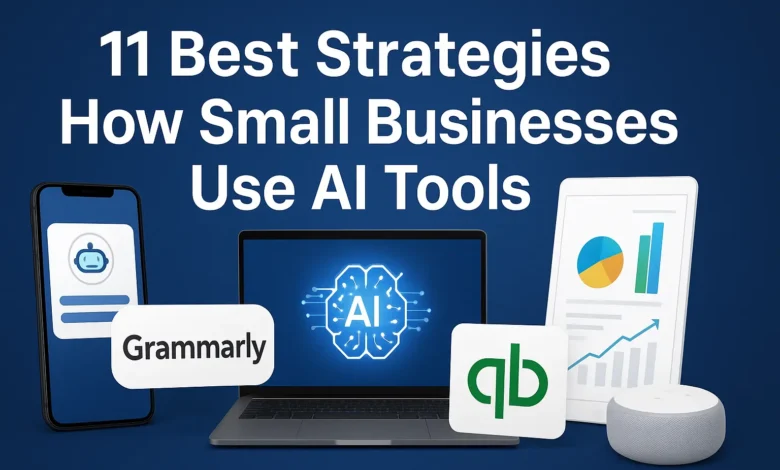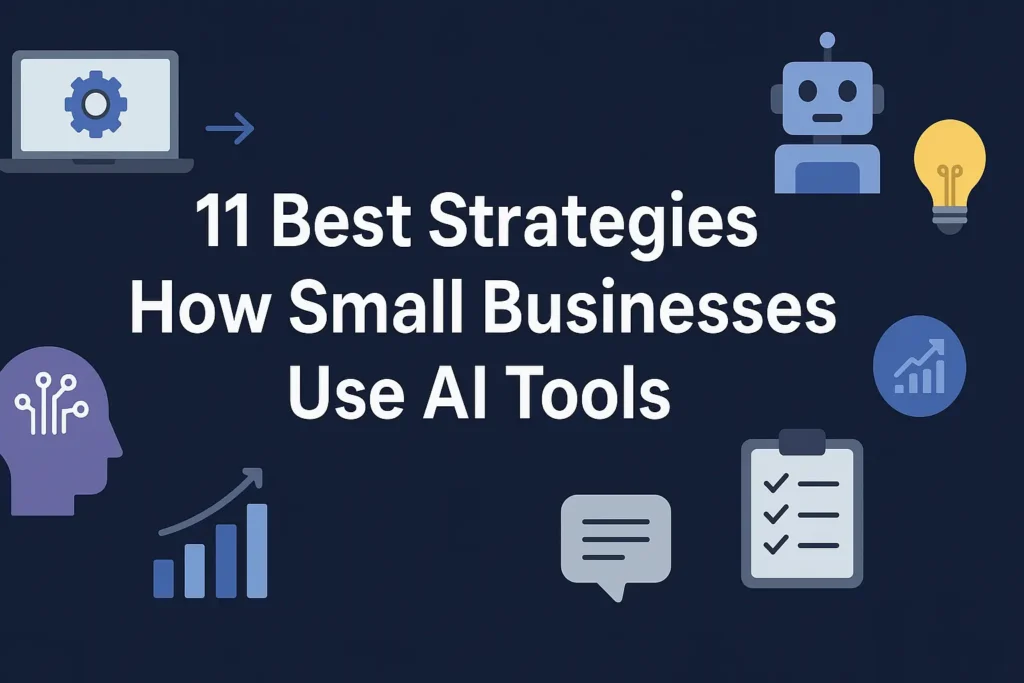11 Best Strategies How Small Businesses Use AI Tools

How small businesses use AI tools is becoming essential in today’s competitive market. AI enables small companies to automate tasks, analyze data, improve customer service, and make smarter decisions. By leveraging AI, small businesses can boost efficiency, save time, and focus on strategic growth.
1. Understanding How Small Businesses Use AI Tools
AI technology is no longer exclusive to large corporations. Small businesses are now adopting AI to handle tasks that used to be time-consuming and costly. Understanding how small businesses use AI tools is the first step toward improving overall productivity.
AI tools help small businesses streamline operations, analyze market trends, and enhance customer engagement. By integrating AI solutions, entrepreneurs can reduce errors, save operational costs, and respond to customers faster, making their business more competitive in a crowded market.
Key Applications:
- Task Automation: Automate repetitive work like data entry and scheduling.
- Data Analysis: AI can detect patterns, forecast trends, and guide decision-making.
- Customer Support: Chatbots provide instant responses and improve satisfaction.
Summary:
Understanding how small businesses use AI tools helps streamline operations, reduce workload, and improve customer experiences.
2. AI Tools for Small Business Productivity
Small businesses can significantly improve productivity by using AI software designed for efficiency. Knowing how small businesses use AI tools allows owners to select the most suitable solutions for their workflow.
These tools can organize projects, optimize schedules, and track performance metrics. From AI-driven project management software to smart analytics platforms, businesses gain clarity and control over operations while minimizing human errors and saving valuable time.
Effective AI Tools:
- Project Management: Platforms like Asana or Trello automate task tracking.
- Smart Scheduling: AI calendars optimize meetings and deadlines.
- Analytics Tools: Google Analytics and other platforms provide actionable insights.
Summary:
AI tools enhance productivity by automating repetitive tasks, improving organization, and offering valuable insights into business performance.
3. Benefits of AI for Small Businesses
Implementing AI in a small business goes beyond productivity—it brings measurable benefits that support growth. Knowing how small businesses use AI tools reveals advantages that can transform operations.
AI helps save costs, increase accuracy, and enable better decision-making. Small business owners can leverage AI for marketing, customer engagement, and operational management, making their businesses more competitive and resilient in a rapidly changing market.
Main Benefits:
- Cost Efficiency: Reduces expenses by automating routine tasks.
- Increased Accuracy: Machine learning ensures reliable results in data processing.
- Smarter Decisions: AI analyzes trends and supports strategic choices.
Summary:
The benefits of how small businesses use AI tools include cost savings, improved precision, and smarter decision-making.
4. Best AI Software for Small Companies
Choosing the right AI software is critical for small business success. Learning how small businesses use AI tools can guide owners in selecting solutions that match their needs.
From automated accounting to AI content creation, various tools cater to small business operations. The right software helps streamline workflow, improve efficiency, and save time, enabling small businesses to focus on growth and customer satisfaction.
Top AI Software:
- Grammarly: Enhances business writing and communication.
- ChatGPT: Assists with marketing, content creation, and customer interaction.
- QuickBooks AI: Automates accounting, invoicing, and financial tracking.
Summary:
Selecting suitable AI software demonstrates practical how small businesses use AI tools for efficiency and business growth.
5. How AI Improves Business Efficiency
AI significantly enhances efficiency by automating tasks that previously required extensive human effort. Understanding how small businesses use AI tools for efficiency can transform business operations.
By adopting AI, companies can optimize workflows, analyze large datasets quickly, and reduce human errors. Efficiency gains allow small business owners to redirect time and resources toward strategic initiatives that generate revenue and improve customer satisfaction.
Efficiency Boosting Examples:
- Workflow Optimization: Organizes tasks and identifies process inefficiencies.
- Predictive Analytics: Forecasts demand, inventory needs, and market trends.
- Smart Communication Tools: Automates emails and segments customers for better engagement.
Summary:
AI improves efficiency by streamlining operations, reducing errors, and enabling smarter business decisions. 
6. Small Business Automation Tools
Automation is central to AI adoption. Knowing how small businesses use AI tools for automation can save time and reduce operational errors.
Automation allows small companies to manage marketing, accounting, HR, and customer interactions with minimal manual effort. By implementing AI-powered automation, businesses gain consistency, faster task completion, and more accurate results.
Popular Automation Solutions:
- Marketing Automation: Mailchimp and HubSpot create personalized campaigns automatically.
- HR Automation: AI streamlines recruitment and onboarding.
- Financial Automation: Invoicing, payroll, and budgeting are simplified with AI.
Summary:
Automation demonstrates practical how small businesses use AI tools to save time, improve accuracy, and focus on growth.
7. Using Artificial Intelligence for Business Growth
AI is a key driver of growth for small businesses. Understanding how small businesses use AI tools for growth can help them compete effectively in crowded markets.
AI enables companies to gather insights, refine marketing strategies, and identify opportunities. It also supports innovation in products and services, helping small businesses scale operations efficiently and respond to customer demands faster.
Growth-Oriented AI Uses:
- Customer Insights: Analyzes behaviors to optimize marketing strategies.
- Sales Optimization: Predictive analytics identifies sales opportunities.
- Product Innovation: AI-driven tools enhance product design and quality.
Summary:
AI supports growth by providing actionable insights, improving decision-making, and enabling small businesses to scale operations effectively.
8. Affordable AI Tools for Startups
Startups often operate on limited budgets. Learning how small businesses use AI tools can help identify cost-effective solutions that maximize productivity.
Affordable AI tools cover essential operations such as accounting, customer engagement, and project management. By choosing wisely, startups can access the benefits of AI without straining resources, gaining a competitive edge in efficiency and innovation.
Cost-Effective Tools Include:
- Zoho CRM: Manages customer relationships affordably.
- Trello/Asana: Free or low-cost project management solutions.
- Hootsuite: AI-powered social media scheduling and analytics.
Summary:
Affordable AI solutions demonstrate practical how small businesses use AI tools to streamline operations and enhance productivity within budget constraints.
9. AI-Driven Decision Making for SMEs
AI helps small and medium enterprises (SMEs) make data-driven decisions. Understanding how small businesses use AI tools for decision-making can lead to better outcomes.
AI analyzes large datasets quickly, providing insights into customer behavior, market trends, and operational efficiency. SMEs using AI can predict demand, manage inventory, and optimize strategies with more confidence than traditional methods.
Decision-Making Applications:
- Predictive Analytics: Forecasts sales and market trends.
- Risk Management: Identifies potential issues before they escalate.
- Operational Planning: AI supports resource allocation and scheduling decisions.
Summary:
AI enables SMEs to make informed, strategic decisions, illustrating real-world how small businesses use AI tools effectively.
10. Challenges of Adopting AI in Small Companies
While AI offers many advantages, small businesses face challenges when adopting new technology. Learning how small businesses use AI tools also means understanding these obstacles.
Challenges include budget limitations, lack of technical expertise, and resistance to change. Overcoming these issues requires careful planning, training, and choosing user-friendly AI solutions that integrate seamlessly into existing workflows.
Common Challenges:
- Cost and Budget Constraints: AI adoption can be expensive initially.
- Technical Expertise: Employees may require training to use AI effectively.
- Change Management: Integrating AI requires adjustments in workflows and processes.
Summary:
Awareness of challenges ensures small businesses can strategically implement how small businesses use AI tools while minimizing risks.
11. AI Marketing Tools for Small Businesses
Marketing is one of the fastest-growing areas where AI makes a difference. Understanding how small businesses use AI tools in marketing can increase reach and engagement.
AI tools personalize customer interactions, optimize ad spend, and automate content creation. Small businesses can compete with larger companies by targeting the right audience efficiently and measuring results in real-time.
Key AI Marketing Tools:
- Chatbots: Enhance customer service and lead generation.
- Email Automation: Tailors campaigns to customer behavior.
- Social Media Analytics: Optimizes posts and advertising strategies.
Summary:
AI marketing tools show practical examples of how small businesses use AI tools to reach more customers and improve engagement.
Conclusion: How Small Businesses use AI Tools
How small businesses use AI tools is a crucial factor in improving productivity, efficiency, and growth. By adopting AI solutions for automation, analytics, marketing, and decision-making, small companies can compete more effectively in today’s market.
From affordable software to advanced AI platforms, the right tools enable small businesses to save time, reduce costs, and focus on strategic priorities. Embracing AI is not just a trend—it’s a pathway to smarter, faster, and more sustainable business operations.
FAQ: How Small Businesses Use AI Tools
-
How can small businesses use AI tools to improve efficiency?
Small businesses can use AI tools to automate repetitive tasks, manage schedules, and analyze data. By integrating AI in workflow and operations, entrepreneurs can save time, reduce errors, and focus on growth strategies. Tools like AI-powered project management and smart analytics make efficiency gains tangible.
-
What are the most affordable AI tools for small businesses?
There are many cost-effective AI tools that small businesses can use. Platforms like ChatGPT, Zoho CRM, and Trello provide automation, customer insights, and project management without heavy investment. Understanding how small businesses use AI tools wisely ensures that startups and SMEs maximize productivity without exceeding budgets.
-
How do AI tools help small businesses with customer engagement?
AI tools enhance customer engagement by automating communication, analyzing customer behavior, and providing personalized experiences. Chatbots, email automation, and AI-driven social media analytics allow businesses to respond faster, predict needs, and improve satisfaction. This demonstrates practical examples of how small businesses use AI tools to strengthen relationships.
-
What challenges might small businesses face when using AI tools?
Small businesses may face challenges such as budget constraints, limited technical expertise, and resistance to change. Choosing user-friendly AI tools, providing employee training, and starting with automation in critical areas can overcome these obstacles. Understanding how small businesses use AI tools helps plan a smooth implementation for maximum benefit.



